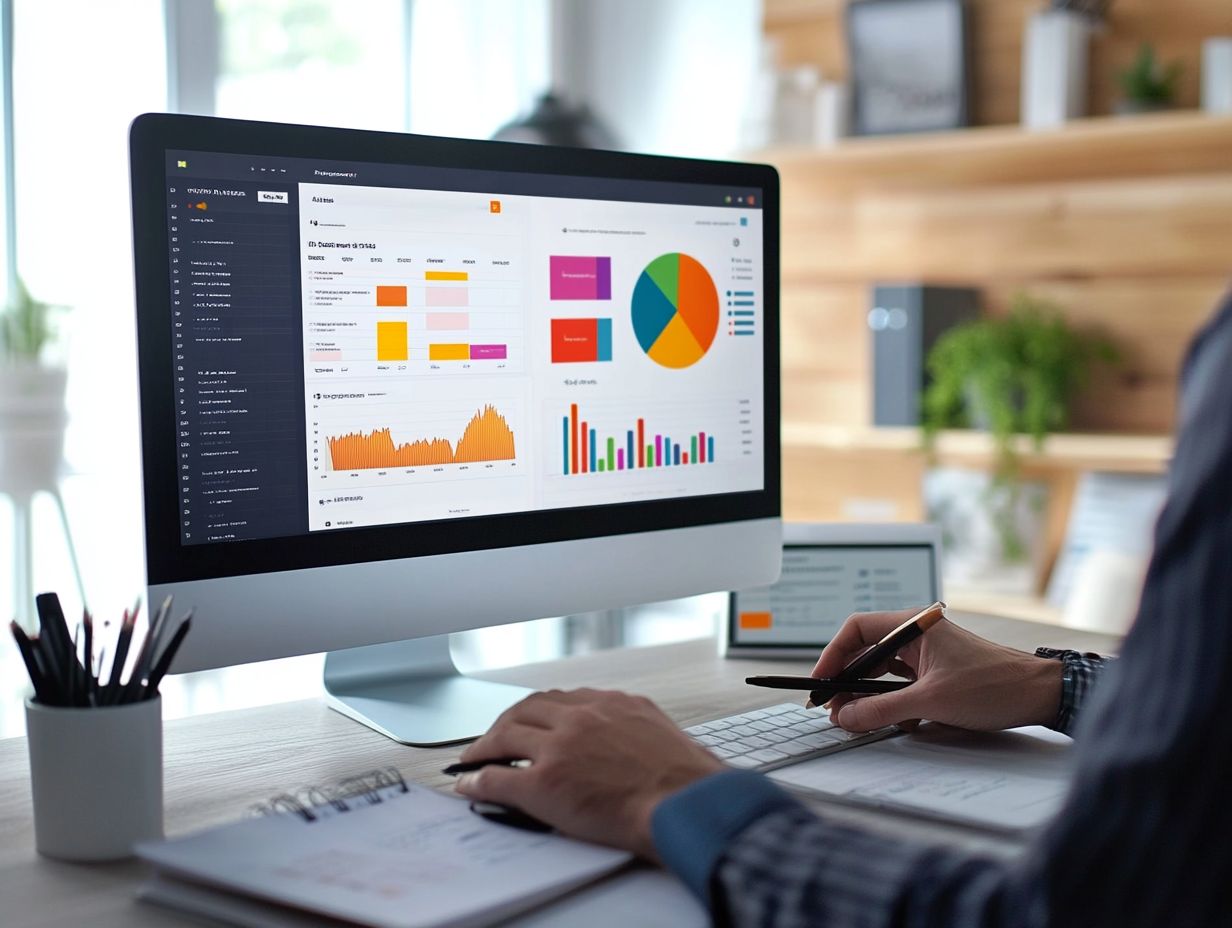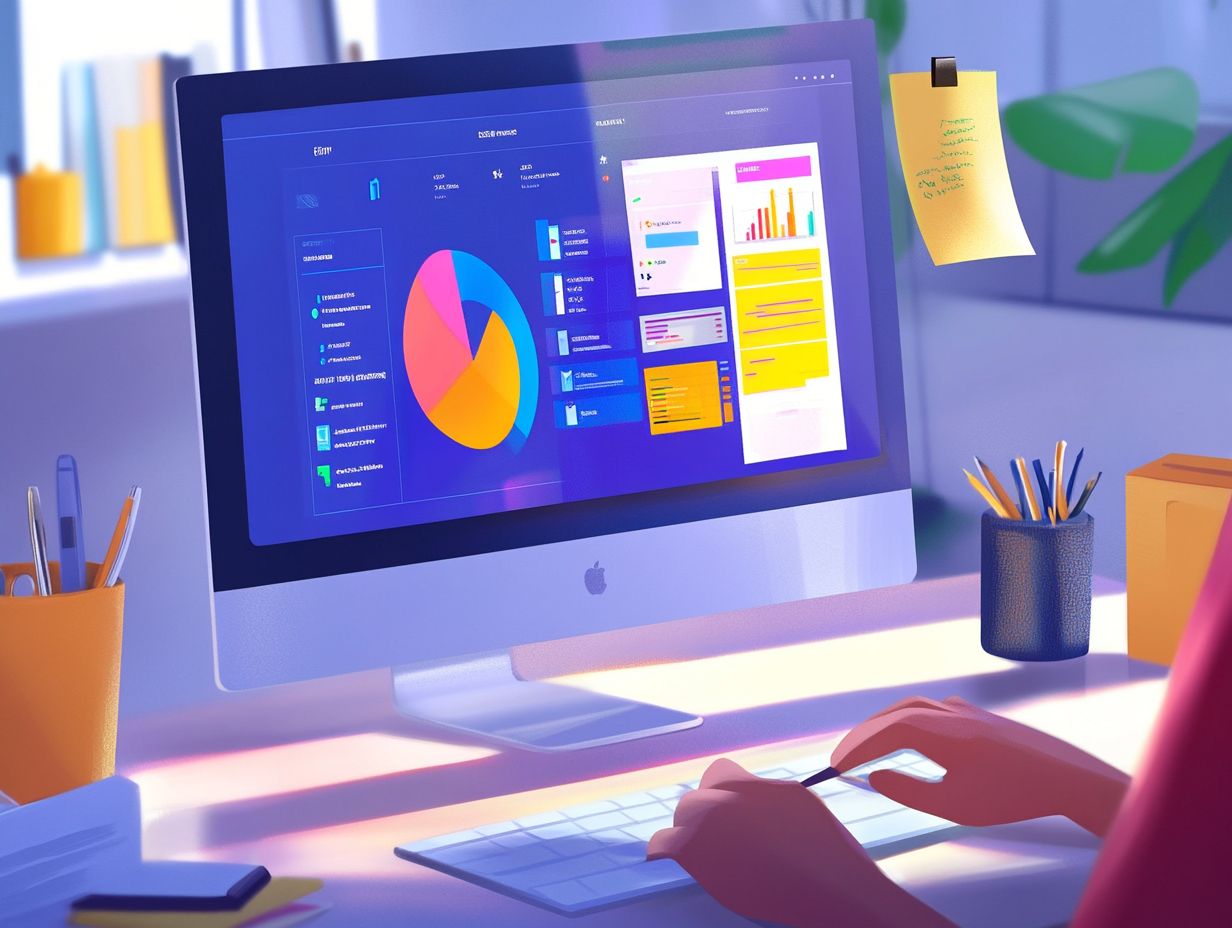Best Practices for Utilizing CRM Dashboards
In today’s fast-paced business landscape, mastering effective customer relationship management (CRM) is essential for achieving success.
A thoughtfully designed CRM dashboard acts as a powerful asset, providing a visual representation of critical metrics that can streamline your decision-making process and boost productivity.
This article delves into the fundamentals of CRM dashboards, highlighting the benefits they offer and outlining best practices for their implementation and use.
Whether you’re aiming to enhance data visualization, optimize your sales processes, or tailor dashboards for various user roles, this guide will lead you through each crucial step.
Unlock your CRM s full potential today and supercharge your business strategy!
Contents
- Key Takeaways:
- Understanding CRM Dashboards
- Benefits of Using CRM Dashboards
- Designing an Effective CRM Dashboard
- Implementing and Customizing CRM Dashboards
- Best Practices for Utilizing CRM Dashboards
- Frequently Asked Questions
- What are the benefits of utilizing CRM dashboards?
- How often should I review my CRM dashboards?
- What are some best practices for setting up CRM dashboards?
- Can I customize my CRM dashboard?
- What should I do if I notice a problem on my CRM dashboard?
- How can I ensure my team is utilizing CRM dashboards effectively?
Key Takeaways:

- Regularly review and update CRM dashboards to ensure accurate data and relevant insights.
- Train and educate users on how to effectively utilize CRM dashboards to drive better decision-making and improve overall efficiency.
- Utilize automation and alerts to improve data accuracy and automate processes, allowing for more efficient use of CRM dashboards.
Understanding CRM Dashboards
Understanding CRM dashboards is crucial for you if you’re looking to elevate your decision-making with data-driven insights.
A well-crafted dashboard integrates various data visualization techniques to showcase real-time information, enabling you to monitor business performance with precision.
By offering a comprehensive view of customer data, these dashboards allow you to track performance indicators and Key Performance Indicators (KPIs), which are measurable values that demonstrate how effectively a company is achieving key business objectives, streamlining processes and enhancing customer satisfaction.
In today’s landscape, where customer insights are key, using CRM dashboards can profoundly influence your sales trends and marketing effectiveness.
What is a CRM Dashboard?
A CRM dashboard serves as your interactive gateway to a wealth of customer relationship management data, providing you with a clear visual representation that enhances your understanding of operations and customer interactions.
This robust tool enables you to monitor key metrics, track sales performance, and analyze customer behavior in real-time. Typically featuring components like charts, graphs, and widgets, dashboards distill vast amounts of information into easily digestible visuals.
You can access essential reports at a glance, facilitating quick decision-making through features such as KPI tracking, which keeps tabs on vital performance indicators, and customizable reporting capabilities tailored to your specific business needs.
By using effective data visualization techniques, these dashboards not only deepen your insights but also enable you to identify trends, uncover opportunities, and ultimately build stronger customer relationships.
Benefits of Using CRM Dashboards
The advantages of utilizing CRM dashboards go well beyond simple data tracking. They are instrumental in enhancing overall business performance by offering actionable insights that not only boost customer satisfaction but also help in future growth.
Improved Data Visualization and Analysis
Improved data visualization and analysis through CRM dashboards enable you to transform complex data sets into intuitive, actionable insights.
These advanced visual tools make interpreting performance metrics a breeze and elevate collaborative discussions among your team members.
By streamlining various data representations, a clear narrative emerges, allowing you to swiftly gauge trends and identify discrepancies. Prioritizing user experience ensures that your dashboards are user-friendly, presenting information in a way that resonates with all stakeholders involved.
Customization features add an extra layer of effectiveness, enabling you to tailor your view according to specific needs, thereby maximizing engagement and enhancing decision-making efficiency.
Streamlined Sales and Marketing Processes

Streamlined sales and marketing processes are among the most significant advantages of utilizing CRM dashboards. These dashboards help you monitor sales trends and optimize your marketing campaigns effectively.
Think of these dashboards as your central hub for integrating various functions, allowing your teams to collaborate seamlessly. By automating routine tasks like lead tracking and reporting, they free up your valuable time. This enables you to concentrate on strategic initiatives that truly matter.
With real-time insights into performance metrics and engagement rates at your fingertips, you can make informed decisions swiftly. This alignment helps your sales and marketing efforts work better together, fostering a cohesive approach to customer interactions and ultimately driving better results across the board.
Designing an Effective CRM Dashboard
Designing an effective CRM dashboard requires a keen understanding of the important measures and key performance indicators (KPIs) that align with your business objectives. This clarity ensures that your dashboard is functional and user-friendly, enabling you to make informed decisions with ease.
Identifying Important Measures and KPIs
Identifying important measures and KPIs is essential to assess your business’s success and pinpoint areas needing improvement through CRM dashboards.
By thoughtfully selecting the right performance indicators, you ensure these metrics align with your overarching business goals. This alignment facilitates progress tracking and enables a more nuanced understanding of operational efficiency and customer engagement.
As you harness these insights, you’ll gain actionable intelligence that can prompt timely interventions and strategic adjustments. Ultimately, this measurement framework helps your teams focus on what truly matters, fostering a culture of continuous improvement and accountability across your organization.
Choosing the Right Data Visualization Tools
How do you make your dashboards truly shine? Choosing the right data visualization tools is crucial for crafting interactive dashboards that meet the specific needs of various user roles within your business.
As you embark on this journey, it s essential to weigh several factors that will influence the effectiveness of these tools. Customization features are key, enabling you to tailor visuals that align with your unique data sets and preferences. Usability is equally important; the tools should be intuitive enough for your team members to navigate effortlessly, without extensive training.
Consider the overall user experience as well. Performance speed and responsiveness significantly affect how effectively insights can be gleaned from the data presented. Choosing the right tools is a strategic decision that sets the foundation for your success!
Implementing and Customizing CRM Dashboards
Implementing and customizing CRM dashboards requires a strategic approach. You’ll want to ensure seamless integration with your existing systems while tailoring features to align perfectly with the unique needs of different user roles. For optimal results, consider following the best practices in CRM data management. This thoughtful customization enhances usability and enables your team to leverage the full potential of the CRM.
Integrating with Existing Systems

Integrating CRM dashboards with your existing systems ensures a seamless flow of data and enhances accuracy. This connection streamlines your processes!
It unifies disparate data sources into a cohesive framework that s easy to analyze. When your various business systems communicate effectively, you gain access to real-time information that fuels knowledge-based decision making.
By synchronizing cloud-based solutions with CRM tools, you eliminate discrepancies, reduce manual data entry, and improve overall data integrity. As a result, clearer insights emerge, enabling you to make strategic adjustments that can significantly boost efficiency and drive growth, creating a more agile business environment.
Ready to start implementing these strategies? Explore CRM solutions that fit your needs today!
Personalizing for Different User Roles
Personalizing CRM dashboards for different user roles greatly enhances usability. This ensures that you and your team can access the most relevant information with ease.
By customizing features to meet the specific needs of your sales, marketing, and customer support teams, you can significantly boost productivity and satisfaction across the board.
Dashboards designed with your responsibilities in mind make it more likely for you to engage with the data. This leads to knowledge-based decision-making.
Effective employee training is crucial in this process. When you and your colleagues are equipped with the knowledge and skills to utilize tailored dashboards, the overall effectiveness of the CRM system skyrockets.
This approach makes workflows smoother and promotes teamwork, ultimately enhancing your user experience.
Best Practices for Utilizing CRM Dashboards
By adopting best practices for utilizing user-friendly CRM dashboards, you can elevate their effectiveness. This ensures that your business maximizes the valuable insights gleaned from its data.
Regularly Reviewing and Updating Dashboards
Regularly reviewing and updating your CRM dashboard is crucial for keeping it relevant. It should accurately reflect your business performance metrics.
This ongoing process ensures that the dashboard evolves alongside your changing user needs and organizational objectives. It captures the nuances of a dynamic business environment.
By actively seeking feedback from users, you can pinpoint areas for improvement and implement necessary changes swiftly. This level of responsiveness enhances the dashboard’s utility and cultivates a culture of knowledge-based decision-making.
When your teams have access to accurately presented, timely data, they can make decisions that align with current trends and strategic goals. This ultimately drives better business outcomes.
Training and Educating Users
Training and educating yourself on how to navigate CRM dashboards can significantly enhance your engagement. It fosters better data-driven decisions within your organization.
By equipping yourself with the knowledge and skills to use these tools successfully, you create an environment where you feel more confident in your capabilities. This newfound confidence leads to a more intuitive interaction with the dashboards.
When you undergo comprehensive training, you’re more inclined to share constructive feedback about your experiences. This feedback can be invaluable for fine-tuning these platforms.
Continuous enhancement of training programs boosts your satisfaction and elevates the overall effectiveness of the organization.
Utilizing Automation and Alerts

Harnessing automation and alerts in your CRM dashboards will supercharge your efficiency! These features can significantly streamline your processes and ensure your teams are promptly informed about key performance changes.
By implementing these tools, you can effectively reduce the need for manual monitoring. This frees up your employees to concentrate on more strategic tasks.
Setting up alerts for critical performance indicators (KPIs) becomes essential. This enables your teams to respond quickly to any deviations that might indicate underlying issues.
This proactive approach facilitates quicker decision-making and boosts overall productivity by ensuring that everyone is aligned on performance metrics.
Embracing such automation tools is vital in today s fast-paced business landscape, where timely insights can truly make a difference.
Frequently Asked Questions
What are the benefits of utilizing CRM dashboards?
CRM dashboards provide a visual representation of important data, allowing for quick monitoring of key metrics. They help in identifying trends, patterns, and potential issues, resulting in more informed decision-making.
How often should I review my CRM dashboards?
It is recommended to review your CRM dashboards daily, as this ensures that you have up-to-date information and can address any potential issues in a timely manner. Implementing CRM best practices for sales team success can further enhance your efficiency.
Start personalizing your CRM dashboard today for amazing results!
What are some best practices for setting up CRM dashboards?
To set up effective CRM dashboards, identify key metrics and performance indicators. For comprehensive guidance, consider maximizing CRM features with best practices. Set clear goals and customize the dashboard layout to fit your needs.
Can I customize my CRM dashboard?
Absolutely! Most CRM platforms allow you to tailor your dashboard by selecting which metrics, charts, and graphs to display, as well as choosing a layout and color scheme that works for you.
What should I do if I notice a problem on my CRM dashboard?
If you spot an issue, investigate it right away. You may need to update your data, adjust some processes, or get help from your CRM provider.
How can I ensure my team is utilizing CRM dashboards effectively?
Provide your team with proper training and support to use CRM dashboards effectively. Encourage regular use and give feedback on interpreting the data.
Also, make sure to review and update the dashboard regularly to meet your changing business needs. This will help maximize its effectiveness!






